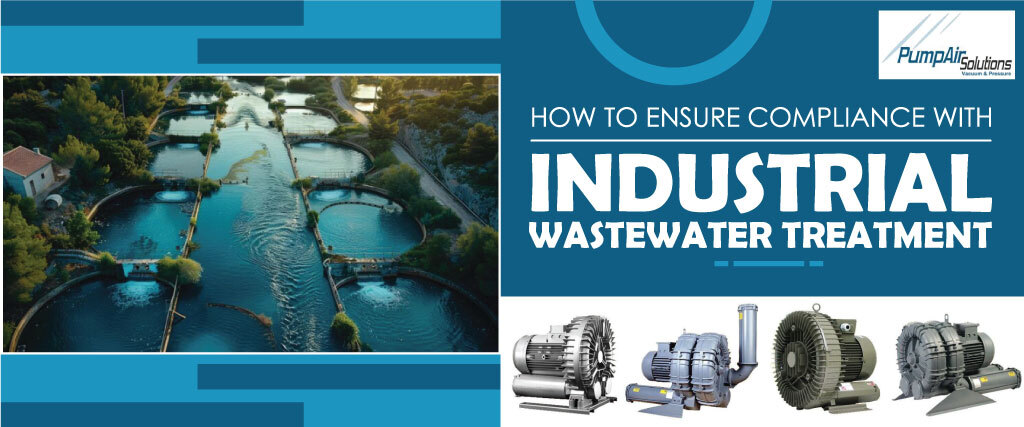An Industrial Wastewater Treatment Blower is essential to preserving wastewater treatment operations’ effectiveness and environmental responsibility. The aeration process depends on this wastewater treatment air blower to treat wastewater properly before it is released into the environment. Therefore, compliance with regulations is crucial to prevent legal complications and ecological damage. In this blog, you will get a comprehensive guide explaining how to ensure wastewater treatment blower compliance.
You can also read our previous blog, “Comprehensive Guide To The Importance Of Industrial Wastewater Treatment Blower”
Understanding Regulatory Frameworks -
The first step towards compliance is understanding the legal frameworks for industrial wastewater treatment blower. Certain laws and regulations apply in different places. These rules establish guidelines for treatment procedures, such as the use of blowers, and specify the maximum amounts of contaminants that can be present in the treated wastewater.
Best Practices for Operation and Maintenance -
It is essential to use best practices when operating and maintaining wastewater treatment air blower. Regular maintenance initiatives should be set up to ensure blowers function effectively and dependably. Important maintenance tasks include lubricating bearings, replacing air filters, and examining blower components for wear and tear.
Implementing a preventive maintenance program can detect potential issues before they become more serious. Therefore, it is important to conduct regular inspections and performance monitoring to ensure that blowers operate within the specified limits. Moreover, maintaining proper logs is also crucial as these documents can be used as proof of compliance during audits.
Continuous Monitoring and Control -
Compliance with industrial wastewater treatment blower requires monitoring of efficient performance and wastewater quality. Installing modern monitoring systems can give access to real-time data on critical factors like dissolved oxygen levels, airflow, and pressure. Automated systems can alert operators to take immediate corrective steps if regular operating conditions deviate.
Analyzing this data regularly helps ensure the wastewater treatment procedure stays within the legal limits. Many contemporary systems can monitor remotely, allowing continuous supervision even when staff members are not present. This supervision level is essential to maintain compliance and maximize efficiency.
Learn noise reduction strategies in our blog, “Noise Reduction Strategies in Industrial Wastewater Treatment Blower
Reporting and Documentation-
One of the most important aspects of regulatory compliance is accurate and timely reporting. Regulatory organizations require regular submission of treatment process data and wastewater quality reports. Ensuring comprehensive and completed reports on time maintains a positive reputation with regulatory bodies.
It is also essential to keep comprehensive records of every step of the wastewater treatment air blower process like operation and maintenance procedures. This documentation offers clear records of compliance efforts, helpful for regulatory audits and inspections.
Leveraging Technological Advancements -
Keeping up with the latest developments in industrial wastewater treatment blower technology helps improve compliance efforts. Energy-efficient blower designs and variable frequency drives (VFDs) are two examples of innovations that can increase operating efficiency and reduce energy usage.
Adding Internet of Things (IoT) gadgets and smart technology to your monitoring systems can give you more detailed information about the quality and performance of industrial wastewater treatment blower. These solutions ensure constant compliance with regulatory requirements by allowing more accurate control over the treatment process and predictive maintenance.
Training & Skill Development -
Investing in staff training and skill development is another way to ensure compliance with wastewater treatment blower. Operators and maintenance staff should know the latest technology, tools, legal requirements, and best practices. Regular certifications and training programs can keep employees updated and ready to handle compliance.
Final Thoughts -
Now you can understand that it is essential to comply with industrial wastewater treatment blower laws to protect the environment and avoid legal consequences. By understanding regulatory requirements, implementing best operation and maintenance practices, monitoring performance regularly, using technological developments, and investing in personnel training, industries can ensure their wastewater treatment blower operates effectively under all applicable standards. These initiatives maintain regulatory compliance and support the general sustainability and responsibility of industrial operations.
Side Channel Blowers is the leading manufacturer and provider of highly efficient, reliable, and affordable industrial wastewater treatment blower, wastewater treatment blower, and wastewater treatment air blower within Australia. Our industrial blower offers continuous performance with virtually zero downtime, making it perfect for all industrial applications. We also provide spare blower parts to reduce the maintenance cost of your blowers. Contact us today to get the best blower for wastewater treatment or visit our website at Side Channel Blowers to learn more about our products and their specifications.

